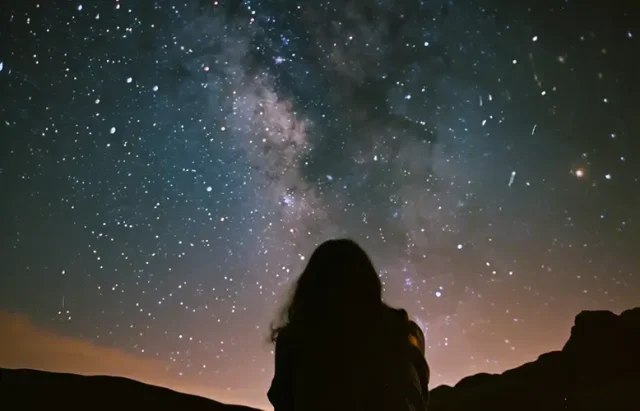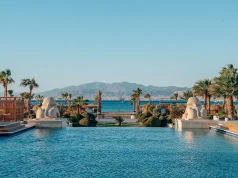
In an age where the neon glow of urban sprawl has dimmed the celestial narratives of our night skies, the year 2024 emerges as a beacon for astrotourism. With approximately 80% of the world’s population under the shroud of light pollution, there’s a growing yearning among travelers to seek out the velvety darkness of remote corners where the heavens spill open in a spectacle of stars. This year marks a monumental chapter in astronomy, with the calendar brimming with cosmic phenomena — from dazzling meteor showers and breathtaking solar eclipses to the otherworldly dance of the northern lights. It’s a time when looking upward promises the awe of the infinite and the thrill of discovery.
Venture with us as we explore the enchanting star-studded nights from the world’s dark sky reserves to eco-conscious resorts, where the wonders of the universe unfold in unparalleled clarity. Whether it’s toasting under the twinkling constellations at Aruba’s Bucuti & Tara Beach Resort, unraveling the mysteries of the cosmos on Sark’s car-free oasis, or journeying through Chile’s astronomical heritage in Santiago, 2024 beckons us to reconnect with the celestial realm. So pack your bags and set your sights skyward; these starlit sanctuaries offer more than just a holiday—they offer a rekindling with the wild and a tranquil refuge for the soul.
Starry Aruban nights at the Caribbean’s first carbon neutral hotel
Bucuti & Tara Beach Resort has launched a new and complimentary self-led stargazing experience – nature’s answer to nightlife – that highlights the stunning constellations that can be seen from Aruba. With no need for maps, hikes, binoculars or telescopes guests can use one of the hotel tablets and the Star Walk app which brings the night sky to life, instantly locating constellations and planets. Sip on a celestial cocktail from the Sand Bar’s Starry Nightcaps menu to enhance the magic of the vibrant night skies. If guests are lucky, they might see Leatherback sea turtle hatchlings taking their first steps on the resort’s beach, guided by moonlight – the perfect way for guests to connect with nature at this eco-hotel.
For more information visit – www.britishairways.com
Visit the world’s first Dark Sky Island, just one hour from the UK
Nestled between Guernsey and Jersey, the tiny and remote island of Sark is car-free, meaning all transport is done on foot, cycling or via horse and carriage. With no streetlights to pollute the skies, Sark was declared the World’s First Dark Sky Island in 2011, providing unmatched opportunities for stargazing (some visitors have claimed never to have seen brighter stars or darker skies). From Sark’s Observatory, built in 2015 and located at the center of the island, planets and many constellations can be seen from its 10-inch Meade telescope. Travelers can stay at country bolt-hole Stocks Hotel, from where they can venture out to the Observatory or spend their evenings gazing up at the heavens.
For more information on Sark as a Dark Sky Island, visit www.darkskyisland.co.uk
Stellar Odyssey: Unforgettable stargazing in Santiago, Chile
Led by local guide Roberto, visitors will be able to embark upon an extraordinary journey that ignites their curiosity and brings them closer to the stars than ever before. During the experience, they will enjoy a visit to the private observatory where they will be welcomed by a friendly artist who will offer commentary on his passion for the stars. Filled with even more curiosity, guests will then begin their daylight exploration as they witness the sun’s mysteries through solar telescopes. Roberto will then guide participants as the beautiful starry night is unveiled and guests are able to delve into the cosmos through telescopes, revealing distant planets and stars.
ToursByLocals offers the five-hour Santiago Stargazing Tour
Uncover the Canary Islands’ Celestial Wonders
Visitors can enjoy a celestial exploration of the Canary Islands led by Abigail Beall, a renowned cosmos expert and author, with exclusive access to some of Europe’s most prestigious observatories in La Palma and Tenerife. Throughout the 7-day itinerary, visitors will uncover the UNESCO-recognised Starlight Reserve of La Palma, celebrated for its pristine stargazing conditions, and immerse themselves in the raw beauty of Tenerife’s Mount Teide National Park, renowned for its volcanic terrains and verdant laurel forests. The trip includes luxurious stays at Paradors de La Palma and Las Cañadas del Teide, blending astronomical discovery with unrivalled Spanish hospitality.
Kirker Holidays in collaboration with New Scientist and Paradores offers The La Palma & Tenerife: Astronomy and Volcanoes tour.
Discover the dark skies of the island of Formentera
Formentera has been awarded the Starlight Tourist Destination certification from the Starlight Foundation for being one of the best places in the world to go stargazing. This certification recognizes Formentera for its clear night skies that allow astronomy lovers to enjoy the panorama of stars above them more clearly. A great place to see the stars is on one of Formentera’s fantastic beaches, such as at the Barbaria area, where guests can find the well-known Lighthouse of Cap de Barbaria. The lighthouse is located on the southernmost point of the Balearic Islands archipelago, making it a privileged enclave in Formentera to enjoy the night sky, especially on new moon nights.
For more information, visit https://www.visitformentera.com.





